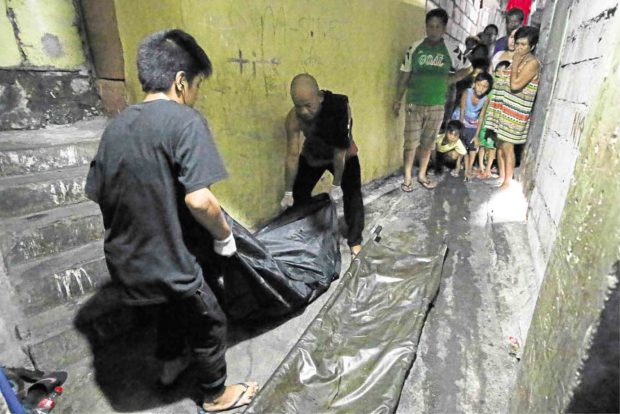
FILE – Funeral home workers retrieve the bodies of two men killed in an alleged shootout with antidrug policemen on Wednesday morning on Doña Hemady Street, Barangay Kristong Hari, in Quezon City. —JAM STA ROSA
MANILA, Philippines — The police force would coordinate and cooperate with the Department of Justice (DOJ) in discussing the latter’s review of anti-drug operations that led to the deaths of suspects, Philippine National Police (PNP) chief Gen. Guillermo Eleazar said on Tuesday.
Eleazar said the review of anti-drug operations would complement his program of reforming the PNP through increased accountability and transparency.
On Monday, Justice Secretary Menardo Guevarra said that he has already finished reviewing 52 of the cases submitted by the PNP, where suspects died. The review is seen as proof that the administration is taking allegations of human rights violations seriously.
“Sa unang araw pa lang ng aking pag-upo bilang Chief PNP ay tiniyak na natin ang agresibong reporma sa aming organisasyon at kabilang dito ang transparency para palakasin ang accountability, itama ang mga kamalian at eventually ay matuldukan na ang isyung ito na naging isang malaking bahid sa aming tagumpay laban sa iligal na droga,” Eleazar said in a statement.
(On the first day of my term as PNP chief, I have already assured the public of an aggressive reform within our organization and this includes transparency to strengthen accountability, correct the wrongs, and eventually remove this big smear from our successful anti-drug campaign.)
“The PNP welcomes this development and we will immediately coordinate with the DOJ to discuss the results of its review,” he added.
READ: Give drug war victims justice, ICC pressed https://newsinfo.inquirer.net/1474532/give-drug-war-victims-justice-icc-pressed
According to the country’s top cop, the PNP has nothing to hide, and its readiness to bring erring police officers to justice is evidence of that.
“Walang itinatago ang PNP at handa kaming papanagutin ang mga pulis na mapatutunayang umabuso sa kapangyarihan o may ginawang katiwalian, lalo na sa ating mga operasyon kontra iligal na droga,” Eleazar said.
(The PNP is not hiding anything and we are always seeking accountability from police officers who would be found guilty of abuse of power or have done corrupt acts, especially in our anti-drug operations.)
Last June 10, the DOJ announced that they have started reviewing the drug war cases where drug suspects were reported to have resisted arrest — the so-called “nanlaban” narrative — which has been a common reason why drug personalities have died in police operations.
READ: DOJ starts review of 53 questionable drug operations https://newsinfo.inquirer.net/1444099/doj-starts-review-of-53-questionable-drug-operations#ixzz73nKB1i4b
The review came after the PNP gave access to its files — something that Eleazar’s predecessors failed to do.
READ: PNP gives DOJ access to files of questionable cases on war on drugs https://newsinfo.inquirer.net/1436171/pnp-gives-doj-access-to-files-of-questionable-cases-on-war-on-drugs#ixzz73nLINj9h
The drug war deaths have been marred by numerous accusations of extrajudicial killings, especially after 17-year-old Kian delos Santos was killed in a police operation in Caloocan last August 16, 2017 — exactly four years since.
Police officers who accosted Delos Santos claimed that he tried to resist arrest and initially opened fire at the authorities, forcing them to retaliate.
However, a Caloocan court in 2018 found three officers guilty of murdering the minor, as a closed-circuit television camera footage showed that police officers dragged the victim before he was summarily executed.
READ: 3 policemen guilty of killing Kian delos Santos — court
Earlier, Eleazar himself assured the public and the Commission on Human Rights (CHR) that the PNP has no policy to kill drug suspects, adding that the conviction of Delos Santos’ provides a “constant reminder” that abusive police officers would not be tolerated.
This was after CHR said that even after Delos Santos’ death, the call to end drug war killings has not changed.
READ: Eleazar: No policy to kill drug suspects; Kian case a reminder to erring cops
READ: 4 years after Kian’s death, CHR asks gov’t anew to stop drug-related killings
Right now, President Rodrigo Duterte and other drug war implementers are facing possible prosecution before the International Criminal Court (ICC) after former prosecutor Fatou Bensouda sought judicial authority to conduct a full-blown investigation into allegations that the crime against humanity of murder was committed.
READ: ICC prosecutor asks for judicial authority to probe case filed vs Duterte
READ: Lawyers pushing for ICC probe as kin of drug war victims see it as last chance for justice